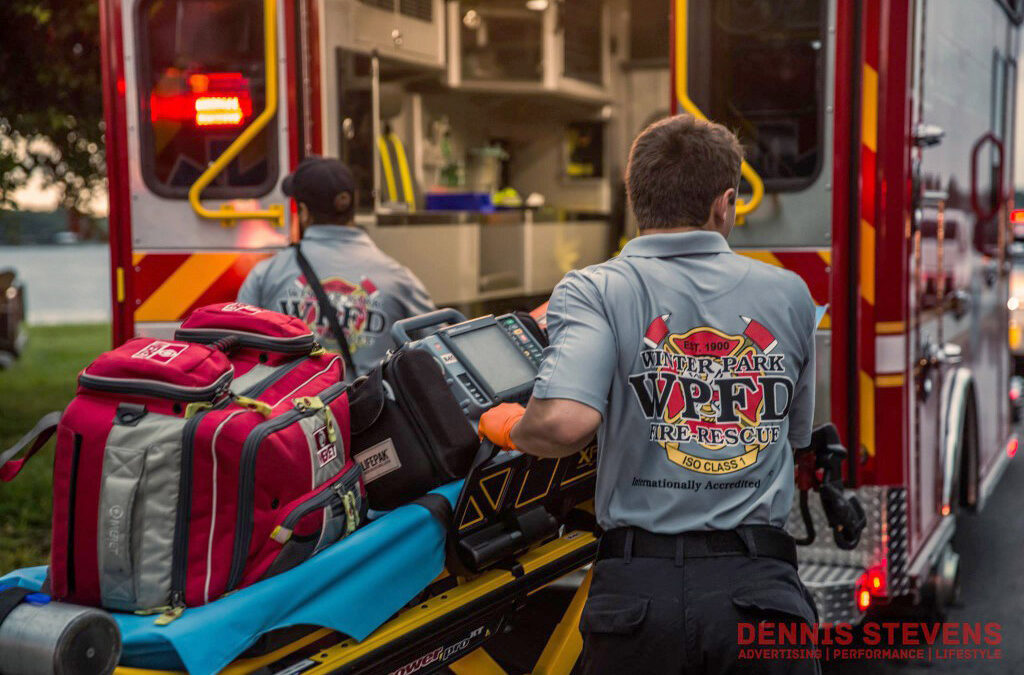
by Beth Kassab | Nov 13, 2025 | City Commission, News, Police and Public Safety, Taxes, Uncategorized
New Firefighter Contract Boosts Pay as Winter Park Faces Rising Public Safety Costs
Base pay will rise 12% this year after negotiations with the union plus cost-of-living and potential merit increases as part of a new three-year contract
Nov. 13, 2025
By Beth Kassab
The base pay for Winter Park firefighters will increase by 12% this year, along with additional cost-of-living and merit raises, under a new three-year contract with the department’s union.
The City Commission approved the contract with little discussion in a 4-0 vote. Commissioner Marty Sullivan was absent.
Mayor Sheila DeCiccio briefly remarked that the city was “fortunate” to have a “high-quality department” serving residents.
Under the new agreement, base salaries for firefighter EMTs will rise from $50,618 to $56,700. Firefighter paramedics will see their base pay increase from $61,908 to $69,300. Both groups will also receive a 2% cost-of-living adjustment and up to 3% in merit raises.
The contract includes merit and cost-of-living adjustments in the second and third years, consistent with those provided to other city employees.
Union President Joe Celletti, a firefighter paramedic who has been with the department about eight years, said the contract will provide increased financial stability for firefighters.
“We’re appreciative of the commission,” Celletti said. “It’s a historic raise for the fire department … we’re on par with Orlando, which is our biggest competitor.”
In addition to the built-in increases over three years, firefighters also have plenty of opportunities for overtime pay and special holiday pay. The contract changed the way firefighters are paid when they call out sick, but Celletti said it was a small concession.
“I think it will definitely keep us at an elite level,” he said. “People might even move out of state to come to a department like ours … you can be a great fireman, a great paramedic and have the financial stability to raise a family comfortably.”
Fire Chief Dan Hagedorn told The Voice in an email that the contract is designed to “maintain Winter Park’s competitiveness in a rapidly evolving regional market.”
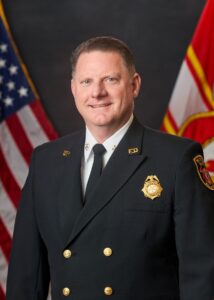
Fire Chief Dan Hagedorn. (Photos courtesy of the city of Winter Park)
He said other area fire departments are “negotiating base pay increases as high as 25–30%,” making it harder for Winter Park to retain firefighters. Turnover, he noted, is costly.
“Losing experienced personnel costs the city thousands of dollars in retraining, onboarding, and lost operational expertise,” he said. “Any turnover impacts the continuity of service and public safety readiness.”
The pay increases come as the Florida Legislature prepares for its session in January, where Gov. Ron DeSantis has urged lawmakers to cut property taxes. Such a measure—if it reaches the November 2026 ballot and passes—could significantly reduce local government revenues.
Property taxes provide the largest share of the city’s General Fund, which pays for police, fire, parks, roads, and other services, including cybersecurity for public data. The General Fund totals about $90 million this year, with property taxes contributing roughly $39 million, or 44% of the total—enough to cover both the police and fire budgets, which are the fund’s largest expenses.
Hagedorn noted that the fire department doesn’t have the option of operating short-staffed, even briefly, when someone is out sick or on vacation. That means paying overtime or other costs to ensure stations are fully staffed every day.
The contract also includes policy changes for personal leave and overtime management aimed at “reducing unscheduled leave, improving staffing reliability, and lowering overtime costs.”
Staffing levels directly affect how quickly paramedics and firefighters can respond to 911 calls for medical help, fires, accidents, or other emergencies.
In 2024, the department’s average response time was six minutes and 52 seconds. So far in 2025, that average has improved to six minutes and 41 seconds. The goal for 2026 is to reach six minutes, according to performance metrics listed in the city’s budget.
The raises will be funded by an additional $350,000 allocated for fire department personnel in the city’s 2026 budget, which took effect Oct. 1.
The increases reflect a broader trend of rising public safety costs for local governments.
Winter Park’s budget includes an additional $700,000 this year for public safety wages across the fire and police departments. Meanwhile, city pension costs for public safety employees are expected to rise by $671,000, according to budget documents.
“Additionally, the governor has recommended in HB 929 that fire personnel have reduced weekly shifts with the same pay,” the budget states. “If this becomes the new standard in the state, the Fire Department would need to hire over 15 additional personnel to provide shift coverage. While only a few cities, such as Kissimmee, have enacted this change, staff is watching closely to see how it might affect future budgets.”
Police and fire expenses account for about half of the growth in the city’s General Fund this year—roughly $3.2 million.
Overall, the fire department’s budget increased by more than $800,000 this year to $17.1 million, with 85 full-time positions.
Just four years ago, in 2022, the fire budget was $13.6 million with 81 full-time positions.
The police budget increased by $2.4 million this year to $21.8 million, with 122 full-time positions. In 2022, the police budget was $16.3 million with 114 full-time positions.
No new positions were added this year. The higher costs stem from wage increases and the city’s new responsibility for providing dispatch services to Maitland, which will reimburse Winter Park for those services.
WinterParkVoiceEditor@gmail.com
To comment or read comments from others, click here →

by Beth Kassab | Oct 2, 2025 | Arts and Culture, News, Uncategorized
Park Avenue District Names Interim Executive Director
The new appointment comes just in time for the holiday season as the city’s Christmas lights are set to turn on Nov. 13
Oct. 2, 2025
By Beth Kassab
The Park Avenue District on Wednesday named Allison Chandler as interim executive director of the organization that will coordinate Winter Park’s signature holiday decor as well other events focused on one of Central Florida’s premier dining and retail corridors.
Chandler, who comes with other nonprofit experience, will help steer the organization as Christmas lights turn on next month along the avenue and the city government embarks early next year replacing streetlights, wiring, landscaping other infrastructure as part of a project known as the “Park Avenue Refresh” that could be disruptive at times to merchants.
Alan Chambers, president of the district’s board, said the group has recently gone through some “growing pains” since it took on the role of coordinating the city’s holiday decor last year.
“We went from 0 to 60 so quickly with taking on the holidays and how much money came in and events,” said Chambers, who is the vice president of operations for the John Craig Clothier family of eight stores across Florida, including two on Park Avenue.
Earlier this week the group announced the departure of Executive Director Carina Sexton along with three board members.
“Over the past six months, the district has navigated growing pains that led to the departure of several key board members, and with Chandler at the helm, the organization is eagerly and actively focused on mending, building, and rebuilding relationships across the community,” a news release stated.
The group, which formed in 2019 to intensify focus on promoting and supporting the Park Avenue area, began spearheading the city’s holiday decorations in 2024 and called the festivities “Christmas on Park” instead of “Hometown Holidays,” a name the city had used for years.
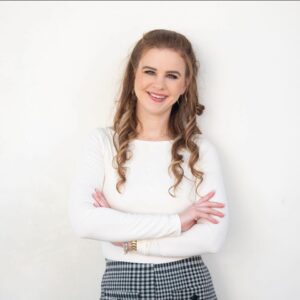
Allison Chandler
This year the city, which contributed $200,0000 in public funds last year and $90,000 this year to the project, asked the name be changed to Holidays on Park to include Hanukkah and Kwanzaa.
The long-held individual traditions in Winter Park that begin next month and run through January will remain the same such as the Christmas Parade, Tuba Christmas and Christmas on the Park. Only the overarching website name is set to change.
But that prompted outrage from some in the community who wanted to frame the request as an assault on Christmas. A resident started a petition that collected more than 1,000 signatures even though some information on the petition was inaccurate.
Chambers said the Park Avenue District spent about $400,000 on holiday festivities last year, most of it from private donations to fund new additions such as a carousel in front of City Hall and a walk-through Cathedral of Lights in Central Park.
Some of the decor purchased last year will be used again this year, though a portion of the new lights was lost to squirrels.
Sarah Grafton, founder of the Park Avenue District and partner at Grafton Wealth Management, said in the news release that she is confident the group will continue to grow its work with Chandler in her new role.
“Her proven leadership in the nonprofit sector will ensure we build on the district’s success, uniting businesses and residents while positioning us for an even stronger future,” Grafton said in the release. “I am proud to be a part of this collaborative board of directors that has made such a positive impact on our community.”
Chandler, a graduate of Leadership Winter Park, has experience in other nonprofits such as development director and interim executive director at PACE Center for Girls, program manager at Plug and Play Tech Center, and founder and president of MPACT Events Co., according to a news release.
“Living in Winter Park, I have seen firsthand the unique spirit and beauty of Park Avenue,” Chandler said in the release. “I am thrilled to help guide the Park Avenue District through its next chapter – building programs, partnerships and celebrations that reflect the heart of our community”.
WinterParkVoiceEditor@gmail.com
To comment or read comments from others, click here →
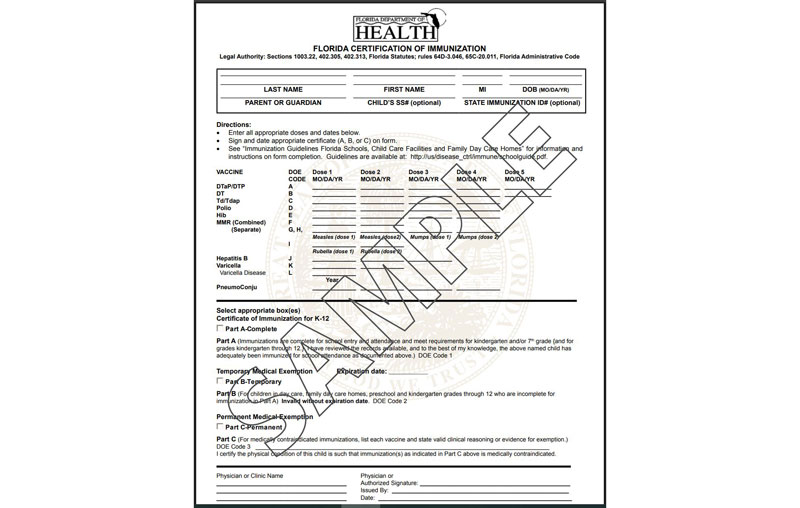
by Beth Kassab | Sep 29, 2025 | News, Uncategorized
How Many Winter Park Students are Vaccinated? Good Luck to Parents Who Want to Know
Florida no longer publishes vaccine rates for individual schools, leaving the public without data to identify areas vulnerable to outbreaks
Sept. 29, 2025
Note: This story originally appeared in the Orlando Sentinel with reporting contributed by the Winter Park Voice. The Voice and the Sentinel are part of the News Collaborative of Central Florida, a group of 10 local news outlets working towards a more informed and engaged region.
By Annie Martin, Orlando Sentinel
Florida is no longer publishing vaccination rates for individual public school campuses, leaving the public without a key piece of information to protect children as state leaders say they intend to end longstanding requirements for students to get shots.
While vaccination data is still available county by county, the state’s failure to provide more localized numbers could mask geographic pockets where immunization rates are particularly low, putting people in those areas at risk from an outbreak, public health experts say.
“When it comes to vaccine-preventable diseases, what really matters is the community that your child is in every day,” said Jason Salemi, a professor at the University of South Florida’s Department of Epidemiology, explaining the value of school-level vaccination data.
It’s not clear why the Florida Department of Health, which previously compiled and published this data, no longer makes it available. The most recent data available is from January 2023, just after Gov. Ron DeSantis was elected to his second term. The health department did not respond to an inquiry from the Orlando Sentinel.
But the reporting change comes as Florida county and state vaccination rates have been dropping for years. Parents have increasingly obtained religious exemptions that allow their children to avoid requirements to obtain key vaccinations in order to attend school.
DeSantis and Ladapo said on Sept. 3 they want to jettison vaccine requirements altogether, though eliminating some of the required shots will require action from the Legislature and it’s not clear whether DeSantis and Ladapo will get the support they need.
Last school year, less than 89% of Florida public and private school kindergarteners were fully immunized, continuing a steep decline since the pandemic. That rate is well below the 95% level, sometimes referred to as herd immunity, which makes it unlikely that a single infection will spark a disease cluster or outbreak.
School-age children who aren’t vaccinated risk transmitting disease not only to their classmates at school but people in other public areas they frequent, such as grocery stores and parks. Areas with low vaccination rates can be particularly risky for children too young to be vaccinated, the elderly and immunocompromised people, said Dr. Jennifer Takagishi, the vice president for Florida’s chapter of the American Academy of Pediatrics.
The campus-level data is especially important for parents choosing where their children should attend school, she said.
“If we want parents to make informed decisions about their child and their risk, they need to have the information to make those kinds of decisions,” said Takagishi, who is based in Tampa. “If their school has a very low vaccination rate, that’s maybe not going to be the right school for their child anymore.”
When an Orlando Sentinel reporter recently requested school-by-school vaccination data from health officials in Central Florida counties, agency spokespeople offered nearly identical responses, saying the state provides only countywide rates and suggesting the reporter contact the local school districts for data on individual campuses.
But when the reporter requested school-level data from four Central Florida districts, only Lake County provided the vaccination and exemption rates for each campus for the current school year. Public information officers for the Orange, Osceola and Seminole school districts said they didn’t have this data, though parents currently must submit proof that their child is up-to-date on vaccines or has obtained an exemption when they register for school.
Though vaccination has become a political issue across Florida, with mostly Republicans pushing to end state-mandated shots, Health Department data shows parents in right-leaning counties are not necessarily more likely to obtain exemptions than their counterparts in more liberal areas of the state. In rural Taylor County, for example, where 64% of voters are registered as Republicans, 97% of last year’s kindergartners were vaccinated. And one of the state’s bluest areas, Broward County, reported one of the lowest vaccination rates, with just 82% of children starting kindergarten with all of their shots.
But campus-level data from the Lake school district illustrates how reporting only countywide rates can mask pockets where vaccination rates are particularly low.
At Leesburg Elementary School, for example, more than 95% of students were fully vaccinated. But at Astatula Elementary, just 82% had received their shots, according to the data provided by the district. That campus, in a rural area south of Tavares, has 17% of its students claiming exemptions, meaning they didn’t need to provide proof of immunization to register for school.
Researchers, public health workers and school administrators all have good reasons to want to know whether most students on an individual campus have received their shots, Salemi said.
“The goal of data like this would not be to single out or ostracise parents or schools or children,” he said. “It’s just about prevention.”
Overall, kindergarteners in nearly every Central Florida county were less likely to be vaccinated than the state average. Orange posted the lowest rate in the Central Florida region, with slightly more than 85% of kindergartners having all their shots, four percent below the state average.
Andrea Rice’s children, ages 3 years and 5 months old, are still years away from starting school, but Florida’s stance on vaccines has already prompted her to consider leaving the community where she grew up. She said she thinks people have forgotten about the dangers of once-common diseases like measles and polio because they were eliminated by vaccines.
Now measles has made a comeback, with more than 1,500 cases reported across the country this year and she fears other viruses could, too. Whooping cough, for example, often results in hospitalization or even death in infants.
And knowing how many kids at her children’s schools would provide a valuable piece of information, the Winter Springs mom said.
“Data saves lives and it has gotten us to where we are, to where the first time ever, the majority of kids reach adulthood,” Rice said.
Winter Park Voice Editor Beth Kassab contributed to this report.
To comment or read comments from others, click here →
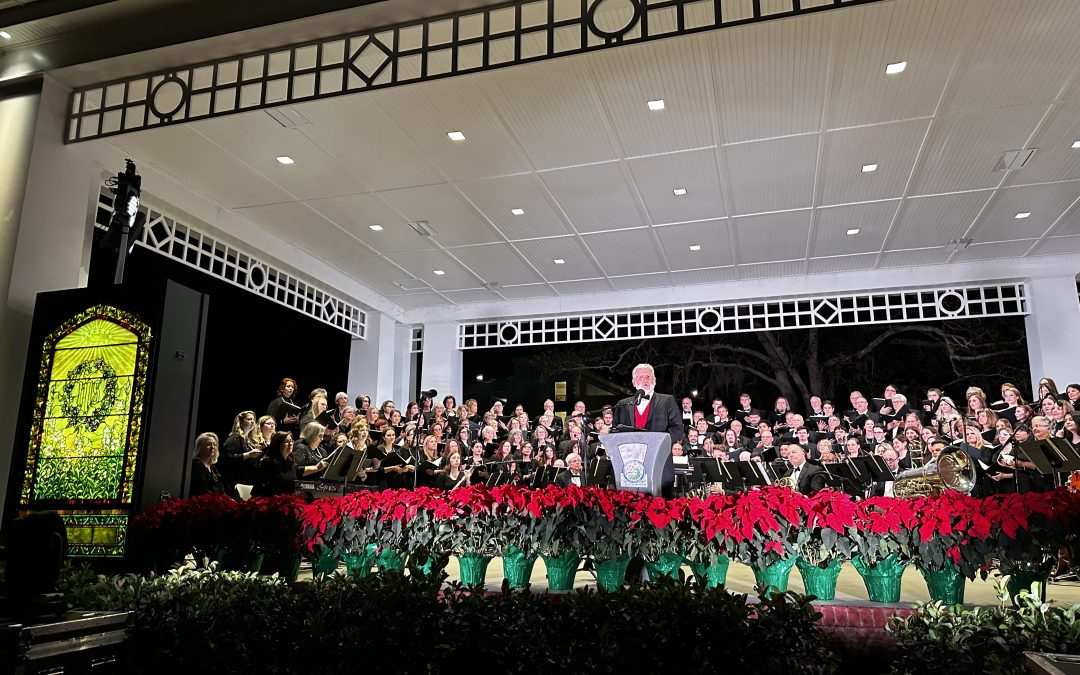
by Beth Kassab | Sep 29, 2025 | Arts and Culture, News, Uncategorized
Executive Director and Three Board Members Exit Park Avenue District
The changes come in the wake of a controversy over whether “Christmas” should be in the title of the city’s holiday decor the group is tasked with overseeing
Sept. 29, 2025
By Beth Kassab
Carina Sexton, executive director of the Park Avenue District, announced Monday she is stepping down, part of a leadership shakeup at the nonprofit that promotes economic development along the city’s historic retail corridor and coordinates the city’s annual holiday lights display.
The changes, which include the resignations of three board members, come in the wake of a controversy over what the group would call the holiday decor with some residents expressing anger that Winter Park city government, which is providing $90,000 this year for the project, requested the name be changed from Christmas on Park to Holidays on Park.
Alan Chambers, the district’s board president, said Sexton and the board “mutually agreed to conclude her tenure” and “wish her the very best in her next chapter.” He did not give a specific reason for the departure other than to say the changes had been in the works for a while and that it wasn’t related to the holiday decorations.
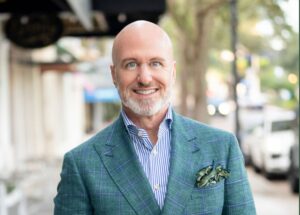
Alan Chambers
“We appreciate all that Carina has done for Park Avenue and her role in this important and inaugural position,” said Chambers, who is vice president of operations for John Craig Clothier, which operates eight Florida stores, including two on Park Avenue. “Our mission remains at the heart of everything we do: Fall in love with the charm, sophistication and the history of the Park Avenue District.”
Sexton said the decision was not the result of disagreement over the title of the holiday decor, and listed the Christmas line-up as one of her key accomplishments.
“The website and the design of Christmas on Park would not have been possible without the incredible time and talent of Tracy Brand-Liffey, whose creativity has left a lasting mark on the District,” she wrote in her resignation letter. “I would also like to express my gratitude to the mayor and city commissioners for their vision, funding, and cooperation in helping to create and move the district forward. Their support has been instrumental in ensuring the success and growth of this organization.”
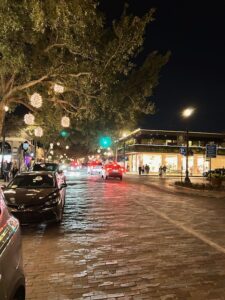
Holiday orbs light up Park Avenue, a familiar feature of the city’s Christmas decor.
Brand-Liffey, who owns New General Cafe on New England Avenue, confirmed to the Voice hat she has left the Park Avenue District’s board, a decision she attributed to personal and professional reasons.
“This was not an easy decision, but the timing feels right given recent personal and professional changes, coupled with the robust challenges this organization faces and the political constraints that have limited our ability to advance initiatives in the way I once envisioned,” she wrote in a resignation.
She declined to elaborate on what she meant by “political constraints.”
Chambers said the group will change the title of the decor and district website that highlights the line-up of events from Christmas on Park, which was first used last year, to Holidays on Park at the request of the city. Some promotional materials that were done in advance, however, won’t be changed in time.
Before the Park Avenue District took over coordination and fundraising for the signature decorations last year and added new features such as a children’s carousel in front of City Hall and a walk-through “Cathedral of Lights” in Central Park, the city called the decor and event line-up “Hometown Holidays.”
It requested a more inclusive overall name this year because the festivities also include celebrations for Hanukkah and Kwanzaa.
But the line-up of events, some of which are led by the Winter Park Chamber of Commerce, still include multiple Christmas celebrations such as the Christmas Parade, Christmas in the Park (which features and outdoor display of Tiffany windows from the Morse Museum and the Bach Festival Society choir) and Tuba Christmas. None of those names or traditions are changing nor did the city request any changes to them.
But as word got out about the request to change the overarching title, a resident started a petition that claimed the city was threatening to put Christmas traditions “at risk.” It made multiple inaccurate claims such as how the city’s Christmas tree would only be referred to as a “holiday tree” and also falsely stated that the annual tree lighting event has been “rebranded as ‘Winter on the Avenue,’ intentionally avoiding any mention of Christmas.”
“Winter on the Avenue” is an event put on by the Chamber of Commerce and the name has been used for years. The chamber’s own web page about the event uses the words “Christmas tree” in the description: “Winners of the Holiday Art Competition will be recognized, Rabbi Dovid Dubov of Chabad Orlando will do a menorah lighting ceremony ushering in the season of Chanukah, and Winter Park Mayor Sheila DeCiccio will lead us in a countdown as we light the Christmas Tree.”
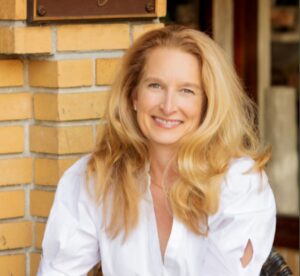
Carina Sexton
The resident, who frequently uses the public comment portion of City Commission meetings to advocate for conservative causes, has refused to acknowledge factual inaccuracies in the petition, which now has more than 1,000 signatures, though it’s unclear how many of the signers live in Winter Park.
Chambers said Tracy Klingler, who owns the boutique Frank, and Ginny Enstad, of Ginny’s Orchids, are also leaving the board, but along with Brand-Liffey will remain involved in helping to steer the organization.
Theresa Smith-Levin, the founder and executive director of Central Florida Vocal arts, is the district’s treasurer and Sarah Grafton, managing partner at Grafton Wealth Advisors, remains advisory board chairwoman. Also on the board are Ricci Culver, who owns Through the Looking Glass boutique; Meredith Gardner, who owned The Grove; Tim Noelke, operating partner at Prato as well as Luke’s; Nora Miller, an attorney at GrayRobinson; Sheila Wyatt, founder of Sheila & Co Moving and Chris Southern, owner and vice president of Bosphorous Turkish Cuisine.
The lights will turn on Nov. 13 and the line-up of events will run through the new year.
Chambers said the group is still fundraising for the decor, which will this year focus on Park Avenue rather than extend to the side streets and Hannibal Square as it did last year.
“We do have some more fundraising to do,” he said. “We have the ability to pay for it, but we are always looking to cover those expenses rather than those things coming out of our general budget.”
WinterParkVoiceEditor@gmail.com
To comment or read comments from others, click here →
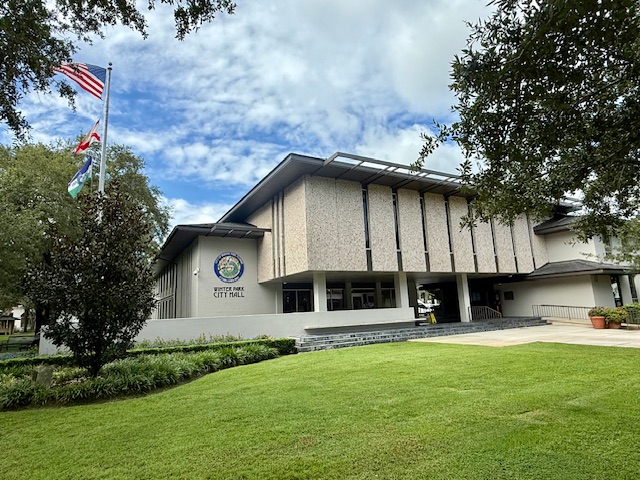
by Beth Kassab | Sep 24, 2025 | City Commission, News, Taxes, Uncategorized
How Today's City Commission Meeting Will Hit Your Wallet
Winter Park is poised to raise fees for everything from a round of golf to after-school programs along with a portion of your power bill
Sept. 24, 2025
By Beth Kassab
Winter Park Commissioners are set to vote Wednesday afternoon on the city’s $230 million budget, which includes an electric rate increase — though lower bills for the time being — and higher prices for everything from cemetary plots, off-duty police, rounds of golf and after-school programs.
The new fee schedule, which is slated to be adopted today along with a second and final vote on the 2026 budget, will take effect Oct. 1.
Some examples:
- Fire department detail for special events (with at least 10 days notice): From $47 per hour (for a minimum of three hours) to $60 an hour.
- Off-duty police officer (with at least seven days advance notice): From $57 per hour to $58 (with a four hour minimum); holiday pay for off-duty officers will move from $82 to $83 per hour.
- Fees for adult sports teams fees will jump from $500 for flag football and softball to $550.
- Youth after-school programs will increase from $50 to $55 monthly for residents and from $90 to $100 for non-residents.
- A single resident space at Palm Cemetery will jump from $5,800 to $6,950.
- Greens fees at the Winter Park Nine for residents on Friday through Sunday will increase from $22 to $26. Electric cart rental will go from $12 to $14 and from $10 to $12 for seniors.
- Rental of the Winter Park Events Center on a Saturday will change from $5,50 to $5,775.
The city’s budget proposal discussed how slower growth forecast in the economy means “adding new services and projects will only be possible in the context of the growth rate of traditional revenue sources such as the millage rate, fees and customer rates.”
The document even went so far as to make clear that fees for services have already become a critical piece of the budget as City Commissions have decided against raising the millage rate (which determines how much residents and businesses pay in property taxes, which make up the largest portion of the city’s general fund). And how future increases are likely:
“As the second largest component of the general fund at 20%, and as one of the few revenue sources that the city has direct control over, charges for services is likely to increase over time as fees and prices for activities and services will have to continue to be raised to support operations. In many municipal circles this is being called the pay-to-play form of providing services to residents and businesses and will only be more crucial if property tax revenue growth rates begin to slow.”
A portion of resident’s electric rates will also climb in October, though total bills will decrease.
That’s because the electric bill includes multiple fees, charges and taxes with some going up and one going down.
The non-fuel portion of electric rates based on how much each customer uses will increase by about 7%. That equates to a monthly jump from $91.46 to $98.26 for a home using 1,300 kwh, according to an estimate provided by the city.
But the charges customers pay for fuel (mostly natural gas in Winter Park) are going down from $49.20 to $29.61, resulting in a lower monthly bill.
Fuel charges, however, are variable and could rise again.
WinterParkVoiceEditor@gmail.com
To comment or read comments from others, click here →
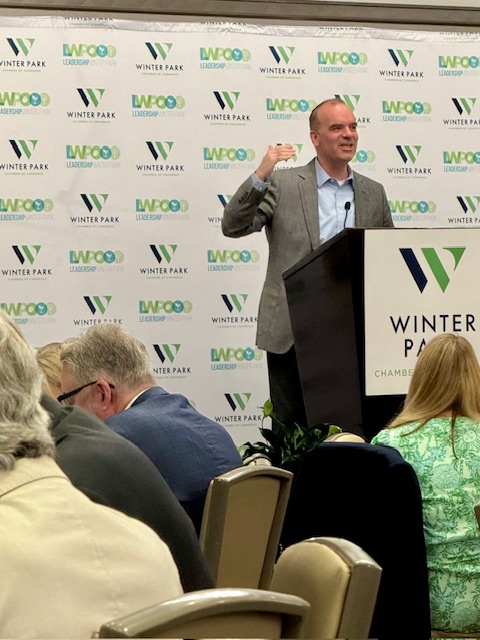
by Beth Kassab | Sep 19, 2025 | City Commission, Election, News, Uncategorized, Zoning and Development
Rethink Zoning Laws? Author Argues Rules Impair Upward Mobility
The Winter Park Chamber offered a zoning history lesson at its annual Outlook luncheon and set the stage for a contested city commission race with Michael Carolan likely to run against Elizabeth Ingram
Sept. 19, 2025
By Beth Kassab
Winter Park Chamber of Commerce President and CEO Betsy Gardner called on city leaders and residents to rethink zoning laws that she says have protected anti-development interests and blunted the opportunities for new housing in Winter Park.
Gardner said the city’s desire to remake Fairbanks Avenue near Interstate 4, now part of the Community Redevelopment Agency, is Winter Park’s next chance to prevent more strip centers and encourage the kind of growth that will attract families and new residents.
“This conversation about land use is also a conversation about who gets to belong,” she said, though she added, “We do not support the replication of the density we see in Maitland.”
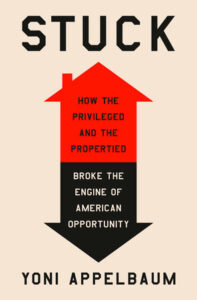
Yoni Appelbaum, pictured above, spoke at a lunch hosted by the Winter Park Chamber of Commerce on Friday.
Gardner’s remarks came at the chamber’s annual Outlook lunch, which explores topics related to economic development. This year’s keynote speaker was Yoni Appelbaum, who wrote, “Stuck: How the Privileged and the Propertied Broke the Engine of American Opportunity.”
Appelbaum, also deputy executive editor of The Atlantic and a historian, discussed how Americans “invented a profound human freedom” known as upward mobility. For more than a century, people were free to move beyond the station in life they were born into and toward prosperous city centers with jobs, social currency and a solid supply of housing stock.
That meant families moved many times, each time upgrading the kind of home they lived in.
But that’s not the case today, he said, as housing is often unaffordable and hard to come by in the places considered most desirable because of proximity to jobs and lifestyle amenities. (Case in point: Winter Park, where the median housing price is $700,000 or more, according to some sources.)
“Americans have stopped moving to the most prosperous places. People now move away from those places and to where the housing is cheap,” Appelbaum said. “Many have the sense that something has gone wrong in their lives .. that some element of the American promise has been broken.”
That’s the kind of loss of community and disenfranchisement credited with sweeping President Donald Trump into office and remaking the focus of the Republican Party.
Appelbaum stayed away from politics in his talk, but said the root of that shift dates back to the beginnings of zoning laws that came about as a way for those already settled in a place — mostly rich and white homeowners — to keep out others who were new and different.
He pointed to early laws in Modesto, CA that segregated Chinese laundry workers into what ultimately became known as “Chinatown” because white homeowners did not like that the workers were also living in their places of business. In 1885, Modesto outlawed laundry facilities “except within that part of the city which lies west of the railroad track and south of G Street,” the book reads.
And zoning laws, often dictating where certain types of businesses could operate, were born.
Later came height caps on buildings in New York City to drive up prices and push sweatshops farther to the outskirts. And historic preservation laws in Charleston, S.C. that he says served to stunt the city economically in the name of preserving a past that depended on enslaved people.
“What I find useful about the past is the ability to imagine different presents and different futures,” he said. “I am not here to tell you to abandon historic preservation or abandon zoning. What I do want for us to all think about is what we’re all after.”
In one passage of his book he discusses how he can see three large apartment buildings going up out his own window that will combine to a couple thousand new units, including more than a fifth described as “affordable.”
“Like all new developments, it leaves a good deal to be desired,” he wrote. “The architecture strikes me as blandly corporate. Local regulations, historic preservation and participatory planning have combined to limit the development on the site to just a fraction of what it might have held … Although I have little affection for cookie-cutter six-story apartment buildings, I don’t want to repeat Veiller’s error of mistaking my own aesthetic judgments for the public good.”
Those apartments, he noted, will mean upward mobility for some families.
Gardner said what happens in the Fairbanks corridor is up to residents and called on attendees — which included Mayor Sheila DeCiccio and commissioners Craig Russell, Marty Sullivan and Warren Lindsey along with city administrators — to use their power in the voting booth in March when two city commission seats are on the ballot.
At a recent workshop commissioners discussed potential rule changes, including lowering transportation impact fees, to encourage development. There appeared to be support for “quality, mixed-use development with a multi-family, workforce housing component, and to develop a comprehensive approach with the Planning and Zoning Board and Economic Development Advisory Board,” according to minutes of the meeting.
In a brief interview after the program, Gardner told the Voice that many people “lost trust” in the public process after the original development guidelines for the Orange Avenue Overlay were overturned, in part by DeCiccio and Sullivan.
Asked who she would support in the March election, she introduced attorney Michael Carolan, chairman of the real estate department at Winderweedle, Haines, Ward and Woodman, as a candidate for Seat 1 on the commission to replace Sullivan, who is retiring after two terms.
Carolan, who was chairman of the chamber board in 2020 and has also served on the board of the Coalition for the Homeless in Central Florida, said he plans to run but has not yet made it official by turning in paperwork to the city clerk.
Elizabeth Ingram is also seeking Sullivan’s seat and officially launched her campaign this week with an email to residents that said she is committed to “protect the qualities that make Winter Park special — its historic charm and small-town character, parks and recreation, and strong sense of community — while planning responsibly for the future.”
The trained opera singer currently serves on the Public Art Advisory Board and led the Dommerich Elementary Parent Teacher Association and is the only person who has officially opened a campaign account so far.
Russell, who serves in Seat 2, has said he plans to seek re-election.
The official qualifying period for the election runs from Dec. 1 to Dec. 8.
WinterParkVoiceEditor@gmail.com
To comment or read comments from others, click here →













Recent Comments